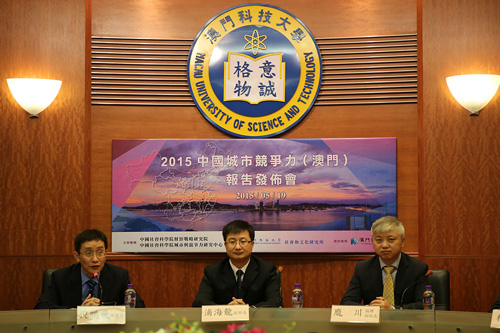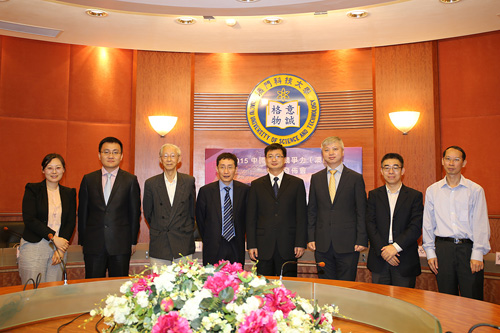 |
 |
The press release for “2015 China (Macau) Urban Competitiveness”, jointly organized by National Academy of Economic Strategy, China Academy of Social Sciences (CASS), Global Urban Competitiveness Research Center for City and Competitiveness, CASS, and the Institute for Social and Cultural Research, Macau University of Science and Technology, was held in Room501 of the administrative building A on May 19, 2015; the event was sponsored by Macao Foundation.
Deputy Director-General Pu Hailong of the Department of Culture and Education, the Liaison Office of the Central People’s Government in the Macao Special Administrative Region, Researcher Ni Peng Fei, Director of the Global Urban Competitiveness Research Center for City and Competitiveness, CASS, Professor Pang Chuan, Associate Vice President of Macau University of Science and Technology, Professor Ieong Wan Chong of the One Country and Two systems Research Center, Macau Polytechnic Institute, Assistant Zhou Quan from the Department of Culture and Education, the Liaison Office of the CPG, Associate Professor Liu Cheng Kun of the School of Business, Macau University of Science and Technology, Assistant Researcher Li Chao of the Global Urban Competitiveness Research Center for City and Competitiveness, CASS, and Post-doc Wang Yu Fei attended the press release. The event was hosted by Director Se ChunWeng of the Institute for Social and Cultural Research, Macau University of Science and Technology; Director Ni Peng Fei and other representatives presented their research outcomes at the meeting.
The ChinaUrban Competitiveness Report was directed by Researcher Ni Peng Fei, Director of the Global Urban Competitiveness Research Center for City and Competitiveness, CASS, and jointly completed by experts of city competitiveness across the two straits and four regions. The Report surveys annually 294 Chinese cities of prefectural level and above, including Hong Kong, Macau and Taiwan, makes assessment of city competitiveness based on long-term researches and experiments and in accordance with a set of index system constructed based on the principle of index minimization, and releases annually the “Blue Paper onUrban Competitiveness of Chinese Cities: China Urban Competitiveness Report” in May; up till 2015, this project has sustained 13 years.
The index system for urban competitiveness is composed of a comprehensive economic competitiveness index that measures the current short-term competitiveness and a sustainable competitiveness index that measures the future long-term competitiveness. The former comprises competitiveness in overall increase and competitiveness in overall efficiency; the latter consists of urban competitiveness in knowledge, urban competitiveness in harmony, urban competitiveness in ecology, urban competitiveness in culture, whole-rangeurban competitiveness and urban competitiveness in information.
The overall economic competitiveness of Macau in 2014 was 0.423, ranking the 9th among the 294 cities of prefectural level and above, and the index of competitiveness in overall increase was 0.034, ranking the 232nd; the index of competitiveness in overall efficiency was as high as a full 1, ranking No. 1. The index of sustainable competitiveness was 0.818, ranking the 4th, following Hong Kong, Shanghai, and Beijing.
Based on the national general patterns, cities with a low ratio of research expenses to finance-revenue generally rank low in terms of overall economic competitiveness; in contrast, cities that rank among the top in overall economic competitiveness correspondingly have relatively higher ratio of research expenses to finance-revenue. Increase of research input, optimization of human resources, and empowerment of the development of knowledge economy, generally contribute to the elevation and sustainment of higher overall economic competitiveness.
Macau is currently devoted to the establishment of “World Leisure Center” and the construction of “Platform for Business and Trade of China and Lusophone Countries”; to achieve such goals, Macau must make greater efforts to advance the moderate diversification of its economy and externally reinforce regional cooperation. For the purpose of sustaining and elevating Macau’s city competitiveness, the corresponding recommendations for policies include: first, on top of sustaining healthy and orderly development of the gaming industry, increase its non-gaming contributions, support the exhibition industry, empower the development of the cultural creative industry, promote diversified economy, adjust its imbalanced economic structure, and minimize the impacts of unfavorable external factors; second, by way of reinforcement of the cooperation with the Guangdong Free Trade Zone,physicalize the construction of the model zone for Zhong Shan Cui Heng New Area of Guangdong-Macau Cooperation, identify as soon as possible its jurisdiction of customary waters and moderately expand the range of its waters, fully participate in the construction of “One Belt And One Road”, overcome the restrictions of Macau’s limited land area, and achieve broader space for development; third, increase expenses for science and research, install funds for industry development, sponsor innovations of medium-size and small-size enterprises; increase investment in education, encourage Macau youths to engage in entrepreneurship, and guide the youth to walk outside Macau to participate in regional cooperation.





